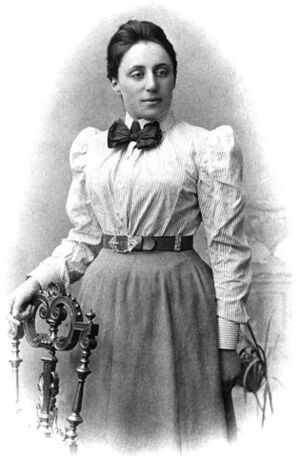Emmy Noether (nonfiction): Difference between revisions
Jump to navigation
Jump to search
No edit summary |
|||
| Line 1: | Line 1: | ||
'''Amalie Emmy Noether''' (23 March 1882 – 14 April 1935) was a German [[Mathematician (nonfiction)|mathematician]] known for her landmark contributions to abstract algebra and theoretical physics. | [[File:Emmy_Noether.jpg|thumb|Emmy Noether.]]'''Amalie Emmy Noether''' (23 March 1882 – 14 April 1935) was a German [[Mathematician (nonfiction)|mathematician]] known for her landmark contributions to abstract algebra and theoretical physics. | ||
She was described by Pavel Alexandrov, Albert Einstein, Jean Dieudonné, Hermann Weyl, and Norbert Wiener as the most important woman in the history of mathematics. | She was described by Pavel Alexandrov, Albert Einstein, Jean Dieudonné, Hermann Weyl, and Norbert Wiener as the most important woman in the history of mathematics. | ||
Revision as of 20:16, 10 December 2016
Amalie Emmy Noether (23 March 1882 – 14 April 1935) was a German mathematician known for her landmark contributions to abstract algebra and theoretical physics.
She was described by Pavel Alexandrov, Albert Einstein, Jean Dieudonné, Hermann Weyl, and Norbert Wiener as the most important woman in the history of mathematics.
As one of the leading mathematicians of her time, she developed the theories of rings, fields, and algebras.
In physics, Noether's theorem explains the connection between symmetry and conservation laws.
In the News
Fiction cross-reference
Nonfiction cross-reference
External links:
- Emmy Noether @ Wikipedia
